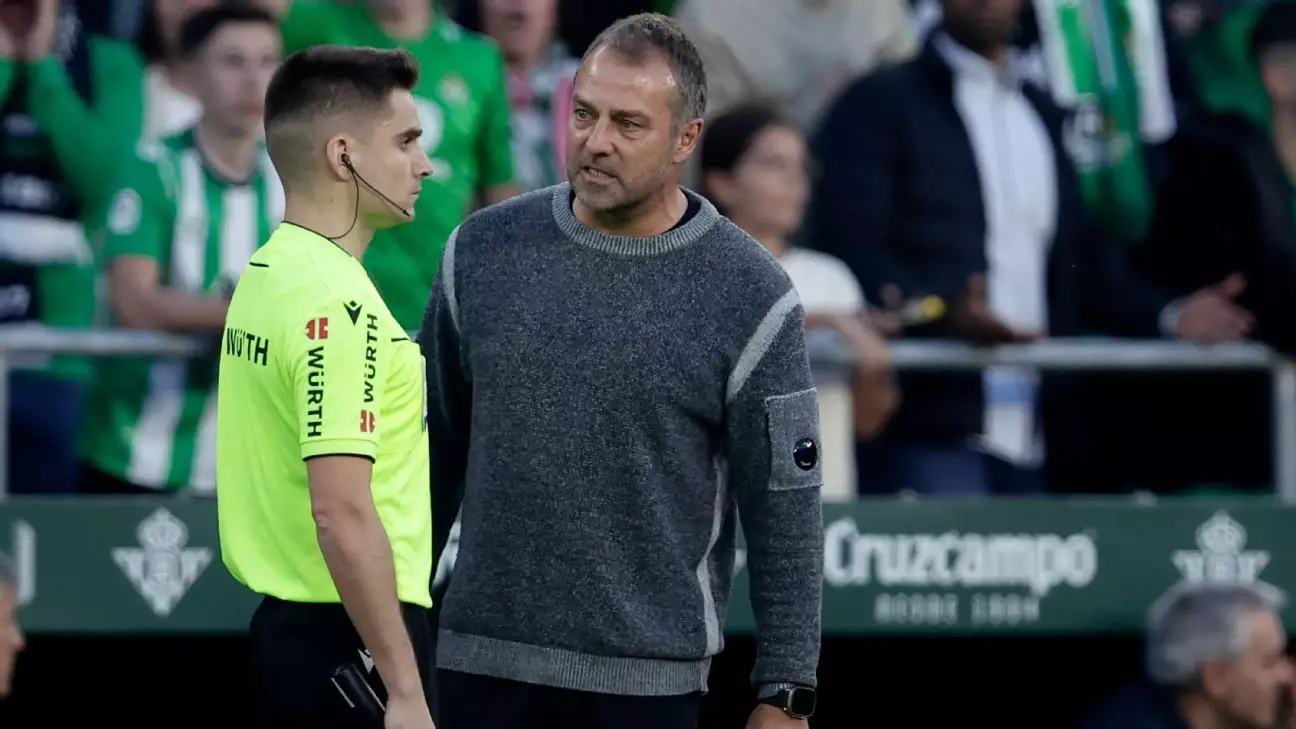As the head coach of FC Barcelona, Hansi Flick finds himself in a critical moment following a controversial sending-off during a recent LaLiga match against Real Betis. His admission of responsibility not only reflects mature leadership but also highlights the importance of emotional regulation in high-stakes sports environments. Flick’s red card stems from a heated exchange regarding a referee’s decision, a situation that can easily escalate, particularly in a game as intense as football, where passion often clouds judgment.
Flick’s statement regarding his need to “improve my control of my emotions” goes beyond self-reflection; it serves as a reminder that coaches are role models for their players. His role demands a cool demeanor, particularly in challenging situations. While it’s entirely human to react emotionally, especially when one feels injustice has occurred on the pitch, the challenge lies in channeling those emotions constructively. The ramifications of his outburst are significant: not only does it cost him two crucial matches on the sidelines, but it also places additional pressure on the coaching staff and players as they navigate their season.
Flick’s outburst and subsequent ban expose a fundamental aspect of coaching—how a coach’s emotional state directly affects the team. The Barcelona squad has experienced a dip in form, dropping points in four out of five league matches before their vibrant Champions League performance against Borussia Dortmund. Flick’s frustrations are understandable; however, the incident reflects a broader theme of the direct impact a coach’s emotions can have on team dynamics.
When a head coach engages in confrontational behavior, it may inadvertently trickle down to the players, impacting their temperaments and influencing how they manage adversity during matches. Flick’s acknowledgment of the need to adjust his reactions is critical; it signals to his players that they too must learn to keep their composure in the face of refereeing decisions that might seem unfavorable. This lesson extends beyond the pitch, where emotional control is equally essential in life and career, reinforcing a culture of accountability that Flick aims to instill within his squad.
Flick’s two-game ban places Marcus Sorg, his assistant coach, in a critical position. The transition to having Sorg at the helm creates an opportunity to explore how leadership roles can adapt amidst challenges. Barcelona fans may be concerned about the potential wildness of the match in Flick’s absence, but it’s also a chance for Sorg to showcase his capabilities. Flick endorsing Sorg’s experience and knowledge serves as a testament to the importance of having a robust support system in coaching staff.
Sorg has a unique opportunity to step into the limelight, using his approach to maintain the team’s strategy and emotional stability. This switch can galvanize the team, showing them that their success isn’t solely dependent on one individual coaching presence. A coach’s character can significantly mold a team’s performance, thus Sorg must demonstrate leadership that synchronizes the squad’s skills and morale.
Looking ahead, Barcelona’s recent return to form against Borussia Dortmund signals their potential for recovery under pressure. The fitness return of vital players like Ronald Araújo opens avenues for strategic reconfigurations in the squad. As Flick prepares for his eventual return, the lessons learned from this incident should foster an environment where emotional maturity becomes synonymous with team identity.
For fans and analysts, it will be intriguing to observe how Barcelona adapts without Flick on the touchline and the influence this has on their gameplay. At the same time, how Flick implements a method of self-regulation and communicates the importance of emotional control will be just as pivotal as any tactical adjustments on the field. Ultimately, this incident serves as a reflective point for Flick, his coaching staff, and players alike—one that emphasizes the undeniable link between emotional intelligence and success in competitive sports.

